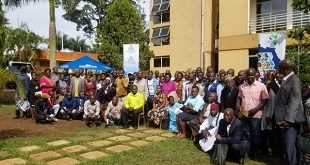
Kampala, Uganda | THE INDEPENDENT | Experts have cautioned Uganda and other East African countries to go slow on the implementation of taxation of digital services.
This comes as the countries prepare to join 133 others around the world to implement the Digital Services Tax (DTS) in line with the taxation plan developed by the Organisation for Economic Cooperation and Development (OECD).
The plan, also referred to as the OECD Bill is aimed at ensuring large online multinationals pay a fair tax of the profits from the businesses in the countries where they operate. The development followed sustained complaints especially by poorer countries that they were not benefiting by providing space for such companies as Google, Netflix, Amazon and Facebook.
While the signatory countries will see some of their existing taxes on the digital service companies replaced by the OECD arrangement, some will be retained, meaning there will be an increase in the tax burden on the company.
The OECD Digital Services Tax plan provides that the current taxes which will be affected be repealed in a transition process which is expected to be completed by the end of 2023. Uganda, Kenya and Tanzania are among the countries that are finalising plans to adopt and implement the plan.
“Uganda is considering levying income tax on the Non-resident entities targeting the income they source in Uganda, a discussion that is still ongoing on the global stage spearheaded by Organisation for Economic Co-operation and Development (OECD),” says URA.
Muriuki Mureithi, an ICT and Cyberspace policy and strategy lecturer at Kenya’s Strathmore University says there is a direct impact on demand and consumption of digital services when taxes are increased or raised. Kenya, for example started taxing digital services last year and doubled the rate to 3 per cent this year amidst warnings from the OECD, and Mureithi says this affected the already low penetration of digital services in Kenya.
Speaking at a virtual dialogue on the OECD plan, Dr Francis Tusubira, a digital policy consultant and a partner at Knowledge Consulting Ltd said Uganda is not yet ready to administer an online digital services tax because it has not yet put in place the required systems to monitor the businesses and track their transactions.
In 2021, the Uganda government introduced a 12 per cent levy on the net cost of internet data and airtime top-up, before a VAT of 18 per cent, replacing the controversial Over-the-Top (OTT) tax which had been introduced in 2018. All other ICT services incur the Value Added Tax, except Mobile Money which are only charged 0.5 percent on withdrawal and a 10 per cent withholding tax.
ICT devices also attract a 10 per cent import duty, while the companies pay a 30 per cent corporation tax. Dr Tusubira says Ugandans using IT get some reprieve because the major companies, MTN and Airtel bear some of the taxes as a way of competing for customers.
Dr Mureithi, who led the Kenya Country Study says that the country has some of the highest tax rates on digital services, with for example, a 20 percent Excise on top of the others. He says that this means that while Kenya had very good coverage, 69 percent of Kenyans are not connected because of the high cost of services.
By the beginning of this financial year, URA says it had made initial contact with many of the non-resident online services companies including Google, Microsoft, Netflix, Meta, Spotify, Zoom, Amazon, Apple, Bolt and Uber and says that since then some of them have registered and paid the tax due. It expects to initially raise at least five billion shillings.
While the experts say the new digital services tax will affect the industry, Mureithi says the governments are in a dilemma, whether to increase the burden on the companies, especially those supplied by the online multinationals or forego the much-needed revenues for development.
Meanwhile, as negotiations go on with the multinational online service companies and with the OECD, Dr Tusubira says the political leaders should have a lesser role and leave most of the work with experts and researchers. He also calls on East African Community governments to negotiate as a block, because then, it will strengthen their voice.
****
URN
 The Independent Uganda: You get the Truth we Pay the Price
The Independent Uganda: You get the Truth we Pay the Price



